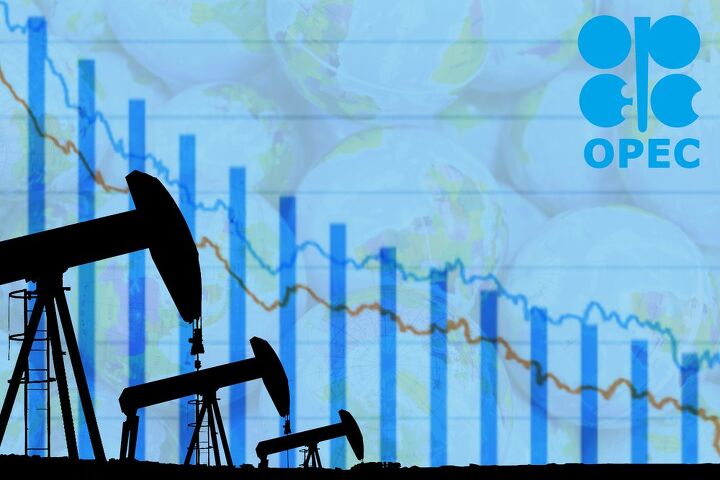OPEC Infighting and Coronavirus Adds Up to Affordable Gas

With the coronavirus keeping people indoors and shale drilling keeping U.S. oil prices relatively stable, you’ve probably noticed gasoline bills being quite reasonable of late. Well, don’t get used to the sums you’re paying now, as analysts project fuel prices will drop even lower as 2020 progresses. While you might think this is due to national quarantines and lessened demand, you’d only be half right.
Last week, the Organization of the Petroleum Exporting Countries (OPEC) failed to strike a deal that would have enacted production cuts to better stabilize the market. Instead of slashing output, Saudi Arabia started slashing prices as it sought ways to ramp up production. Russia immediately responded by promising to increase its own output, leading to what looks like an all-out price war.
On Monday, oil prices dropped nearly 25 percent — knocking off about 10 bucks per barrel and leaving the per-barrel price hovering around $31. It was the largest single-day decline for U.S. West Texas Intermediate crude and Brent crude since 1991. While Tuesday morning saw a meaningful bump in prices as portions of the market came to its senses, OPEC members don’t seem to be on better terms.
According to Reuters, Saudi Arabia plans to supply 12.3 million barrels per day in April — a massive increase over its current production level of 9.7 million barrels per day. Russian oil minister Alexander Novak initially said he would not rule out joint measures with OPEC to stabilize the market, adding that the next OPEC+ meeting was planned for May-June. His tone changed slightly on Tuesday, however, with suggestions that the nation could raise its oil production by up to 300,000 barrels per day in the short term — something a few market analysts have claimed was its plan all along.
It’s probably not the best time for OPEC to try and tear itself apart (though that hasn’t stopped it in the past). China, the world’s largest oil importer, is currently hamstrung by the coronavirus. Other regions may follow shortly. Saudi Arabia seems to be attempting to grab market share but with demand so low, it’s a real gamble. Russia and U.S. shale producers are in a better position to weather the storm. Meanwhile, analysts are concerned the Arabian kingdom couldn’t possibly sustain the price cuts and increased output for any significant length of time without hurting itself.
While this could have long-term implications for the oil industry, it’s also likely to drive down gas prices though the spring. National averages (in the U.S.) are around $2.38 per gallon and dropping during a period where prices normally ramp up to meet higher summer demand. Patrick DeHaan, head of petroleum analysis at GasBuddy, expects per-gallon prices to fall below the two-dollar threshold by April if trends persist.
The International Energy Agency (IEA) is likewise concerned that the coronavirus could recreate what happened in 2016 when we had our last major global oil surplus. Bad for the world economy, but fantastic for your back account, as gas prices were similarly low back then. Of course, there are heaps of uncertainty in the market with varying assumptions as to how bad the pandemic will actually get. Many see it as a minor hurdle that will primarily impact China while others are convinced it will be much worse than anticipated. Most are simply shrugging their shoulders as they watch the market.
“The situation remains fluid, creating an extraordinary degree of uncertainty over what the full global impact of the virus will be,” the IEA reported this week. “In the IEA’s central base case, demand this year drops for the first time since 2009 because of the deep contraction in oil consumption in China, and major disruptions to global travel and trade.”
[Image: Gumpanat/Shutterstock]

A staunch consumer advocate tracking industry trends and regulation. Before joining TTAC, Matt spent a decade working for marketing and research firms based in NYC. Clients included several of the world’s largest automakers, global tire brands, and aftermarket part suppliers. Dissatisfied with the corporate world and resentful of having to wear suits everyday, he pivoted to writing about cars. Since then, that man has become an ardent supporter of the right-to-repair movement, been interviewed on the auto industry by national radio broadcasts, driven more rental cars than anyone ever should, participated in amateur rallying events, and received the requisite minimum training as sanctioned by the SCCA. Handy with a wrench, Matt grew up surrounded by Detroit auto workers and managed to get a pizza delivery job before he was legally eligible. He later found himself driving box trucks through Manhattan, guaranteeing future sympathy for actual truckers. He continues to conduct research pertaining to the automotive sector as an independent contractor and has since moved back to his native Michigan, closer to where the cars are born. A contrarian, Matt claims to prefer understeer — stating that front and all-wheel drive vehicles cater best to his driving style.
More by Matt Posky
Latest Car Reviews
Read moreLatest Product Reviews
Read moreRecent Comments
- TheEndlessEnigma Hybrids and PHEVs make sense, EV's do not.
- Ajla My understanding is that the 5 and 7-Series cater almost exclusively to the Chinese market and they sell them here just so they don't look weak against Mercedes and Audi.
- EBFlex Interesting. We are told there is insatiable demand for EVs yet here is another major manufacturer pivoting away from EV manufacturing and going to hybrid. Did these manufacturers finally realize that the government lied to them and that consumers really don’t want EVs?
- Kwik_Shift_Pro4X What's worse than a Malibu?
- MaintenanceCosts The current Malibu is poorly packaged; there's far more room inside a Camry or Accord, even though the exterior footprint is similar. It doesn't have any standout attributes to balance out the poor packaging. I won't miss it. But it is regrettable that none of our US-based carmakers will be selling an ordinary sedan in their home market.


































Comments
Join the conversation
Gasoline prices are below $2.00 a gallon in Metro Detroit, for the first time in a long time. I'm surprised President Trump hasn't yet (in a tweet) tried to take credit for that, as he has for pretty much everything that's happened (except for those for which he tried to deflect blame).
No on anymore ethanol subsidies. Just what we need increase ethanol content and ruin the engines in our vehicles.